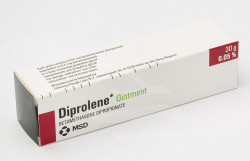Diprolene (betamethasone) Coupons, Discounts & Cost
Diprolene (betamethasone) is an anti-inflammatory and anti-allergic agent for topical use. One way to save money on the Diprolene (betamethasone) retail cost regardless of income and insurance status is to use Diprolene (betamethasone) coupons or discount cards from RXCoupons. Use our Diprolene (betamethasone) coupons at your online pharmacy and receive up to 75% off the sale price each time you refill your prescription.
Diprolene indications
Diprolene (betamethasone) is an anti-inflammatory and anti-allergic agent for topical use. The active substance is betamethasone (topical corticosteroid). The drug reduces itching and reduces vascular permeability. It is used to treat atopic dermatitis, contact dermatitis, neurodermatitis, exfoliative dermatitis, urticaria, dermatitis herpetiformis, seborrheic dermatitis, Hyde's disease, eczema, psoriasis, lichen planus, itchy skin, discoid lupus erythematosus, erythroderma (in the complex therapy).
Betamethasone is also used in patients with scleroderma and other systemic diseases of connective tissue, severe allergic reactions, alopecia, recurrent aphthous stomatitis, allergic conjunctivitis, iritis, iridocyclitis, keratitis, chorioretinitis.
What are the precautions when using Diprolene (betamethasone)?
Diprolene (betamethasone) contraindications: hypersensitivity, cutaneous manifestations of syphilis, bacterial, viral, fungal skin diseases, skin cancer, atheroma, melanoma, hemangioma, xanthoma, sarcoma, rosacea, acne vulgaris, post-vaccination skin reactions, systemic fungal infections, HIV infection, tuberculosis, chickenpox, herpes simplex, peptic ulcer, stomach and duodenal peptic ulcers, diverticulitis, esophagitis, gastritis, congestive heart failure, thrombophlebitis, arterial hypertension, diabetes, osteoporosis, myasthenia gravis, hypoalbuminemia, severe liver and kidney damage, psychosis, open-angle glaucoma, problems with blood clotting, rash in children up to 1 year (associated with diaper rash).
Use with caution in pregnancy (especially at higher doses), cataracts, diabetes, glaucoma, tuberculosis. Do not apply on large surfaces.
Diprolene (betamethasone) dosage and administration
Apply Diprolene (betamethasone) to the affected areas 2-6 times per day. Apply a small amount of cream or ointment and rub gently. The multiplicity of applications may be reduced to 1-2 times per day. Diprolene treatment should not exceed 5 days in children and in patients with facial skin disorders.
Diprolene (betamethasone) side effects
Diprolene (betamethasone) therapy can cause the following negative effects: burning, itching, steroid acne, dryness, folliculitis, hypertrichosis, secondary infections of the skin and mucous membranes, hypokalemia, muscle weakness, myopathy, osteoporosis, spontaneous fractures, hypertension, myocardial dystrophy, arrhythmia, thrombosis and thromboembolism, steroid diabetes, hypothalamic-pituitary-adrenal axis suppression, Cushing's syndrome, insomnia, euphoria, agitation or depression, anxiety, psychosis, glaucoma, cataracts, withdrawal syndrome (in case of sharp termination of long-term therapy); rarely - sodium and water retention (edema), pigmentation disorders, dermatitis. Long-term therapy: skin atrophy, hirsutism, telangiectasia, purpura, hypopigmentation, systemic manifestations (gastritis, ulceration of the gastrointestinal mucosa).
Diprolene (betamethasone) overdose
Betamethasone overdose symptoms include nausea, vomiting, insomnia, euphoria, agitation, depression. Long-term therapy at high doses: osteoporosis, fluid retention, high blood pressure, Cushing's syndrome, secondary adrenal insufficiency. Treatment: gradual withdrawal of the drug.
Diprolene (betamethasone) interactions
Liver enzyme inducers reduce the therapeutic and toxic effects of the drug.
Glycosides, diuretics (causing potassium deficiency), amphotericin B, carbonic anhydrase inhibitors may increase the risk of arrhythmia and hypokalemia.
Alcohol and NSAIDs may cause ulcerative erosive lesions or bleeding in the gastrointestinal tract.
Imunosuppressants may lead to lymphoma and other lymphoproliferative disorders.
Betamethasone reduces the hypoglycemic activity of antidiabetic drugs and insulin. It should be used with caution with diuretics, coumarin derivatives, heparin, streptokinase and urokinase. I
Betamethasone increases liver toxicity of paracetamol. It reduces the concentration of salicylates, mexiletine.
Diprolene (betamethasone) special instructions
Use betamethasone with caution in diabetes, systemic lupus erythematosus, osteoporosis, in patients at risk of thrombosis, in the elderly, in children (abscesses, septic infections, tuberculosis). It is necessary to take care in hypothyroidism, cirrhosis of the liver, adrenal insufficiency. Patients should avoid drinking alcohol during therapy.
Avoid contact with eyes and mucous membranes.

